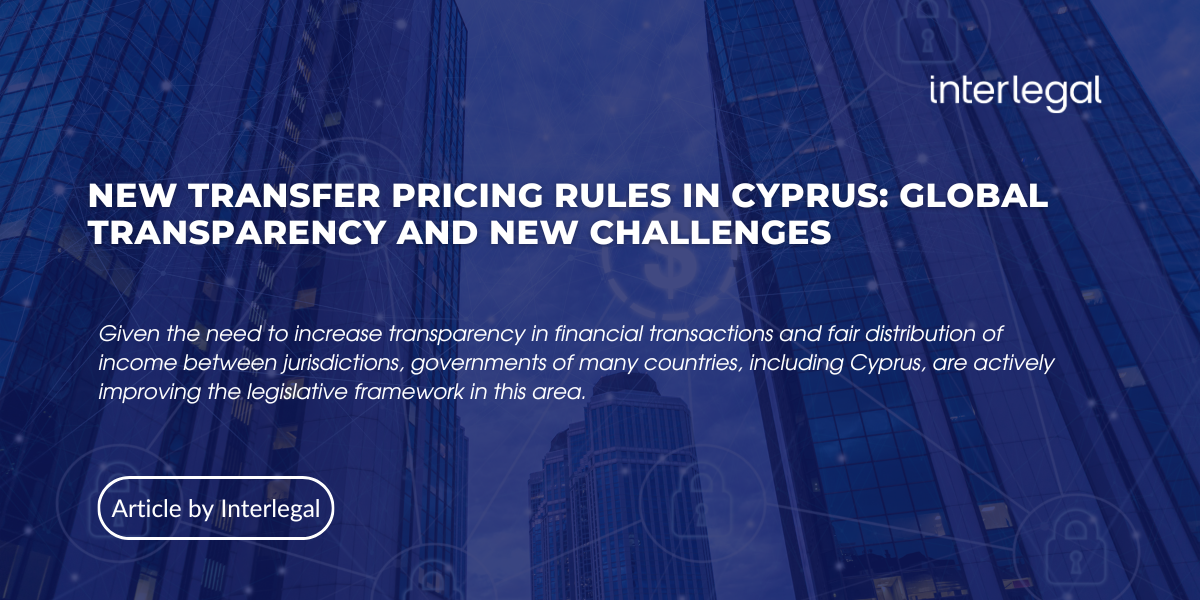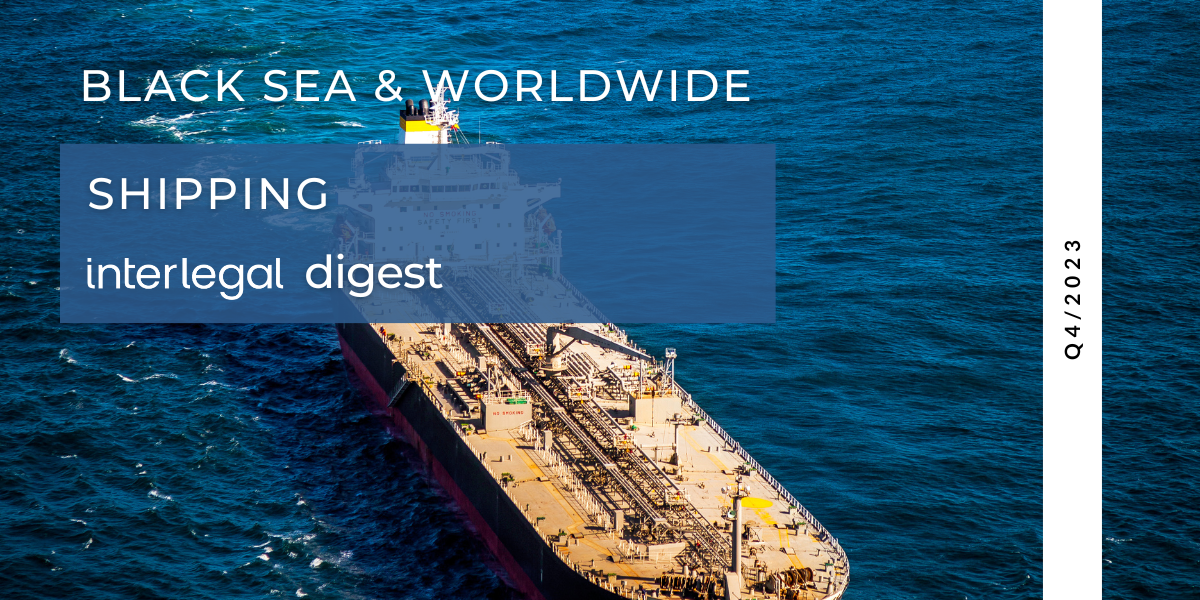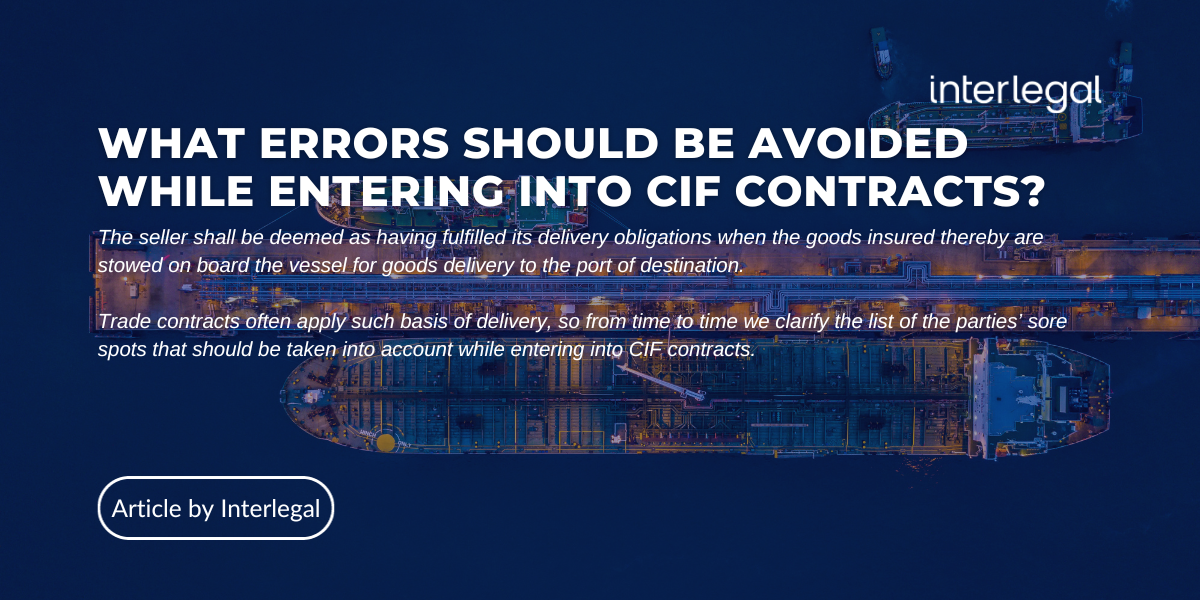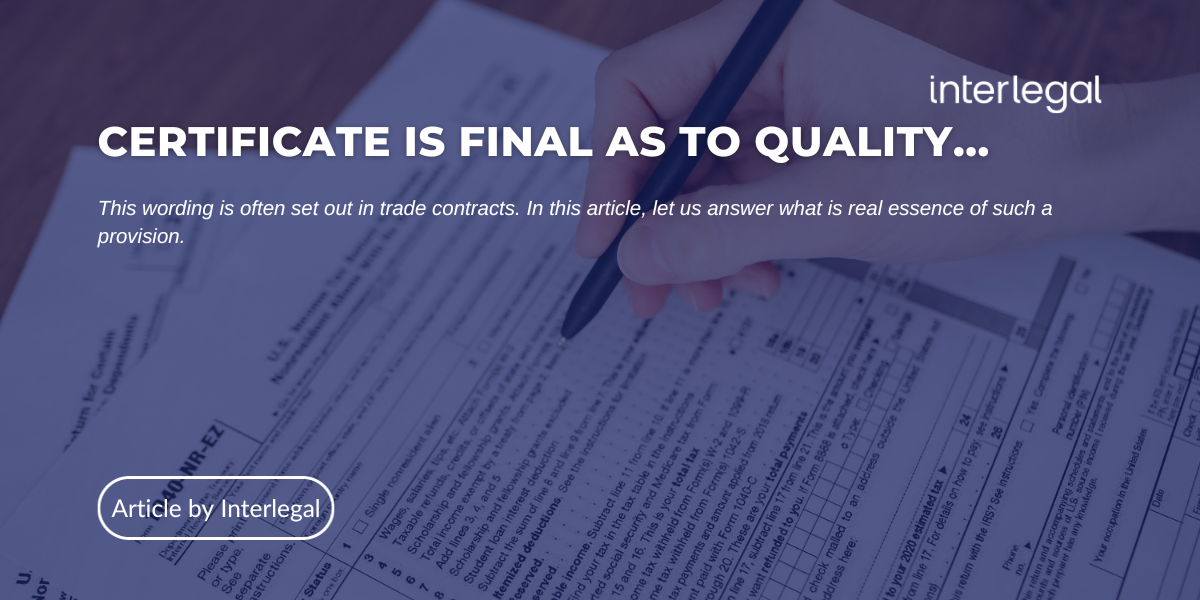Interlegal Shipping digest Q4 2022
9 December, 2022
5

Interlegal Quarterly Shipping Newsletter
BIMCO PUBLISHES UPDATED GENCON-2022 CONTRACT?
In order to reflect the commercial and legal requirements in today’s shipping practices, on 25 October BIMCO has updated and presented the most widely used voyage charter party in the dry bulk sector on a worldwide basis – GENCON.
GENCON las updated in 1994 and being one of BIMCO flagship charter parties it must reflect the challenges of the modern shipping industry.
The GENCON 22 version aims to strike the right balance with?regards to the rights and obligations of both parties in a charter party. For that purpose, BIMCO has amended several key clauses and made the charter party standard more comprehensive. Furthermore, the new version attempts to fill the gaps of interpretation that leaves a little room for disputes through clear wording and structure.
The Owners Responsibility Clause (Clause 2) is one of the key clauses that has been amended. In the previous 1994 version, this clause was criticized for dissatisfactory allocation of risk between the ship owner and the charterer. This clause granted owners broad protection for loss, damage, or delay to the cargo, even in case of negligence on part of the crew. Meanwhile, the clause provided less security for the owners in terms of other events, accidents, and financial loss, therefore it had to apply the Paramount Clause for detail regulation. BIMCO’s view is that such replacements failed to provide a balanced solution, therefore the new clause entitles the owners to rely on the rights, defences, immunities, and limitations of liability available under the Hague-Visby Rules. Furthermore, the clause place duties on the ship owner to exercise due diligence to provide a seaworthy ship and properly care for the cargo. The applicability of the seaworthiness obligation was set between the loading of the cargo and the commencement of the laden voyage.
Besides above, BIMCO has also added a new clause 3 regulating the risk and liability of damage to the cargo during loading, stowage, carriage and discharge.
The GENCON 22 continues to place the responsibility for the cost and risk of cargo operations on the charterer. While the responsibility for delays is split between the parties, in that the owners bear the risk for delays by navigation risks within their control and charterer for commercial risks. Moreover, the new version continues to protect owners against liability for cargo loss or damage but is remedying the charterers risk by placing fundamental duties on the owners before commencement and under the voyage through clauses 2 and 3.
GENCON 22 significantly differs from its predecessors, which sought mainly to clarify and update the charter party standard. The new version is presented by BIMCO as a whole new charter party which aims to reduce the initial costs for both sides of entering into a charter party through reducing needed adjustments. At the moment it remains unknown how long will it take for adaption to the new version on the market, however we are sure that it will catch on in the long run.
Misdelivery by the carrier after discharge and the Article III Rule 6 time bar: the ‘Alhani gap’ is filled
FIMBank p.l.c. v KCH Shipping Co., Ltd [2022] EWHC 2400 (Comm)
The Commercial Court (Sir William Blair) has handed down judgment in FIMBank p.l.c. v KCH Shipping Co., Ltd, an appeal under section 69 of the Arbitration Act 1996, holding that the time bar in Article III rule 6 of the Hague-Visby Rules can apply to claims in relation to misdelivery after discharge, that resolves an important question which had not previously been decided by the English courts.
Background
The claim was brought by FIMBank p.l.c. (“FIMBank”), as the holder of bills of lading, for the alleged misdelivery of cargo by the contractual carrier, KCH Shipping Co., Ltd (“KCH”). The bills were concluded on the Congenbill form, and were subject to the Hague-Visby Rules, including the time bar in Article III r 6 of one year after delivery which applies to claims against carriers.
FIMBank served a Notice of Arbitration on KCH after that time bar expired. The Claimants’ position was that its claim was nevertheless not caught by the time bar. The following arguments were provided:
(a) on the facts, delivery took place after discharge; and
(b) as a matter of law, the time bar did not apply to claims for misdelivery occurring after discharge.
In claim submissions it was also stated that the Hague-Visby Rules do not regulate a carrier’s obligation to deliver cargo (as opposed to the carriage of goods by sea), and only relate to a ‘period of responsibility’ which ends with the discharge of cargo. The Claimants also referred to Clause 2(c) of the Congenbill: “The Carrier shall in no case be responsible for loss and damage to the cargo, howsoever arising prior to loading into and after discharge from the Vessel …”. Basing on it they further argued that the parties had, in any event, contractually disapplied the Rules in respect of the period after discharge.
As a result, the arbitral tribunal determined that FIMBank’s claim was time-barred irrespective of whether delivery post-dated discharge on the facts. The Award mentioned the following:
- the Hague-Visby Rules time bar can apply to claims relating to misdelivery occurring after discharge; and
- (ii) Clause 2(c) of the Congenbill form does not disapply the Rules in respect of the period after discharge.
The Court’s reasoning
Soon there was an appeal on above issues, however it was dismissed by the Court, which upheld the tribunal’s decision on both questions.
On the first issue, the Court concluded that, on its true construction, Article III r 6 of the Hague-Visby Rules applies to claims for misdelivery of cargo after discharge. And even if such conclusion was wrong, the tribunal’s decision was in any event justified by its finding that the bills of lading contained an implied term providing that the Hague-Visby Rules obligations and immunities are to continue after actual discharge and until delivery takes place, in line with the reasoning of the Court of Appeal in The MSC Amsterdam [2007] EWCA Civ 794.
On the second issue, the Court held that, on a proper construction, Clause 2(c) did not disapply the Hague-Visby Rules to the period after discharge. Although the Claimants relied in this regard on The MSC Amsterdam, in which the express terms of the bill of lading concerned were held to have disapplied the Hague Rules after discharge, the Judge held that that decision did not warrant a different result, insofar as it featured a bill of lading with materially distinguishable terms.
BIMCO publishes Electronic Bill of Lading Standard for Bulk Shipping
Issuing bills of lading electronically has been possible for more than 20 years. However, less than 2% of world trade is carried on electronic bills of lading. This is partly due to lack of open standards and interoperability, i.e. lack of possibility to transfer an eBL from one approved platform to another. This is a particular issue for trade finance banks wanting to transition from paper bills to eBLs. Aiming to help increase adoption of digital trade documents in shipping, BIMCO has published an electronic bill of lading standard.
The BIMCO electronic bill of lading standard is a structured dataset consisting of 20 predefined data fields that are common to bulk shipping bills of lading. Its design is consistent with bills of lading used in the bulk sector, for example, CONGENBILL. This means that the underlying framework applies equally to BIMCO’s various bills of lading and other bulk bills of lading, for example house bills. The standard is freely available to any electronic bill of lading solution provider.
Needless to say, that BIMCO’s eBL Standard is aligned with the UN/CEFACT Multimodal Transport Reference Data Model as well as the standards produced by FIT Alliance members. The members of the FIT Alliance are: BIMCO, DCSA, FIATA, the International Chamber of Commerce (ICC) and SWIFT.
BIMCO Advice about holiday legislation
A recent dispute about laytime in a Ukrainian port was dropped as soon as BIMCO’s advice about holiday legislation and labour laws was received.
Background
Ukraine has imposed martial law and the articles in the Labour code governing holidays have been suspended as a result. This is what led to the disagreement between the owner and the charterer.
In Ukraine, in common with countries such as the UK and the US, if a holiday falls on a Sunday, then special working arrangements are applied or transferred to the following day (Monday) to compensate workers for the fact that the holiday coincided with a day they would not anyway have worked.
In this particular case, the holiday was 1 May, which fell on a Sunday meaning that special working arrangements would be applied to Monday 2 May.
- The charterers therefore considered that laytime would not run on that day. They said that as 1 May was a Sunday, the holiday normally held that day was instead held on 2 May.
- The owners disagreed and pointed to the Ukrainian martial law which had suspended holidays. The owners thus felt that 2 May was not a holiday and that laytime would run on that day.
Conclusion
BIMCO advised that because of martial law suspending the law on holidays in the labour law of Ukraine, the owners were correct to argue that 2 May was not a holiday – and that even 1 May could arguably not be considered a holiday under BIMCO’s definition.
“We are happy to inform you that Charterers have accepted BIMCO’s comments and paid demurrage in full in line with Owners’ laytime calculation.”
War and warlike operations in a time of uncertainty
The outbreak of war can have serious consequences on charterparties of all kinds, therefore it is extremely important for industry to develop several standard clauses to clarify the parties’ obligations in such uncertain times.
CONWARTIME 2013
The most commonly used war clauses in the market are BIMCO’s “war risks clause for time chartering 2013” (“CONWARTIME 2013”) and the “war risks clause for voyage chartering 2013” (“VOYWAR 2013”). The definition of war risks is identical under the clauses:
“War Risks” shall include any actual, threatened or reported:
War, act of war, civil war or hostilities; revolution;
rebellion; civil commotion; warlike operations; laying of mines; acts of piracy and/or violent robbery and/or capture/seizure (…) acts of terrorists; acts of hostility or malicious damage; blockades (whether imposed against all vessels or imposed selectively against vessels of certain flags or ownership, or against certain cargoes or crews or otherwise howsoever), by any person, body, terrorist or political group, or the government of any state or territory whether recognised or not, which, in the reasonable judgement of the Master and/or the Owners, may be dangerous or may become dangerous to the Vessel, cargo, crew or other persons on board the Vessel.”
War risks include acts of hostility or malicious damage by “bod[ies]”, including “terrorist” and “political” groups. This would have included the irregular and often unidentified military personnel which took part in, for instance, the annexation of Crimea, and would include the authorities of the disputed regions of Ukraine under Russian occupation, such as Crimea.
VOYWAR 2013
The BIMCO explanatory notes clearly interprets the primary differences between the forms:
“In contrast to CONWARTIME, where a war risk may exist before or after a charter party has been concluded, VOYWAR focuses on the position before loading or after the voyage has commenced.”
This reflects the difference between a time and a voyage charter. In particular, sub-clause (b) of VOYWAR 2013 allows owners to cancel the charter before loading has commenced, if owners or the master are satisfied that the performance of the contract will expose the vessel to war risks, in their reasonable judgement.
This grants owners flexibility to react to changing events.
The situation is changing once cargo has been loaded, because at that point owners become bailees of the cargo and cargo interests become entitled to a bill of lading for the cargo under Article III Rule 3 of the Hague and Hague-Visby Rules. This is then covered by sub-clause (c) of the VOYWAR 2013 form.
Both VOYWAR 2013 and CONWARTIME 2013 rely on the “reasonable judgement” of the owners or the master in deciding whether the vessel, cargo, crew or others on board “may be” exposed to war risks. This highlights the difference between CONWARTIME 2013 and the previous CONWARTIME 1993 clause, as the former was amended requiring a “real likelihood” of danger. BIMCO’s explanatory notes to the CONWARTIME 2013 form comment as follows.
“In order to remove potential uncertainty, the test for determining whether to proceed has been amended and is now based on whether an area is dangerous. The level of danger is likely to be high but a stated reference point removes the need for complex analysis of degree of risk and whether or not it is more or less likely to occur.”
Therefore, it should be taken a significant care when the old CONWARTIME 1993 clause applies. In that case, the Triton Lark test will continue to require a “real likelihood” of danger.
Above mentioned underlines the bargain struck in the CONWARTIME 2013 clause: before the vessel has proceeded into the area, the test defers to the reasonable judgement of owners and the master. Once the vessel is already there, the clause does not mention the reasonable judgement test, but simply asks whether the area is dangerous or “may become dangerous”.
Key factors in assessing danger
The factors which will be relevant to owners and/or the master will depend on the circumstances of the individual case and cannot be definitively listed. However, the following factors should ordinarily be taken into account include:
- The JWC (Joint War Committee) listed areas, which are areas where owners are required to notify underwriters of voyages. For instance, Ukrainian and Russian waters in the Black Sea and the Sea of Azov were included in the listed areas from 00:00 hours GMT 28 February 2022 during a period of rising tensions, and before the invasion of Ukraine proper began.
- News reports, in particular involving attacks on marine traffic.
- P&I club circulars and other warnings.
- Input from maritime security agencies.
Conclusion
It is obvious, that the current invasion of Ukraine amounts to war or warlike operations sufficient to trigger the standard war risks clauses.
However, these rules remain open to be tested in the context of more asymmetric warfare in the future, such as in the initial stages of the invasion of Crimea. In the light of above cases, we expect the wording of these clauses to be tested by the Courts and as a result to be updated and adapted if necessary.
Latest UK sanctions against Russia
On 21 July 2022, the UK’s recent sanctions against Russia came into force. Whilst broadly looking to align themselves with existing EU sanctions, there are notable differences between how these UK sanctions will be applied which are now discussed within this update.
Amongst other things, UK introduced a prohibition on the import, acquisition and supply or delivery of Russian oil and oil products into the UK, and the provision of technical, financial and brokering assistance relating to such products destined for the UK. Such oil ban comes into force on 31 December 2022.
The restriction on providing financial services to oil and oil products has implications even for the UK’s insurance sector. From 31 December 2022, UK insurers will be prohibited from providing insurance services in respect of the import, acquisition and supply or delivery of the listed oil and oil products that originate in Russia or are located in Russia, that are destined for the UK.
However, there are some limited exceptions to the oil ban, including if the oil and oil products are cumulatively:
- non-Russian origin;
- not owned by a person connected with Russia; and
- only being loaded in, departing from or transiting through Russia.


























































